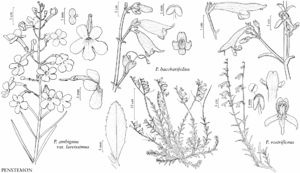Penstemon baccharifolius
Bot. Mag. 78: plate 4627. 1852. (as Pentstemon)
Stems 12–50 cm. Leaves: cauline 5–15 pairs (distal ones much-reduced), 5–30(–46) × 4–15 mm, blade base tapered to acute to cuneate, margins sharply dentate, especially distally, or entire, apex obtuse to acute. Thyrses (2–)5–15(–40) cm, verticillasters (2 or)3–7(–12), cymes 1- or 2(or 3)-flowered; proximal bracts elliptic to lanceolate, 2–5 × 1–3 mm; peduncles and pedicels glandular-pubescent. Flowers: calyx lobes elliptic to ovate, 3.5–5 × 1.5–2.2 mm; corolla unlined internally, 22–27 mm, glandular-pubescent internally, tube 4–5 mm, throat 6–7 mm diam.; pollen sacs 1.2–1.5 mm; staminode 16–19 mm; style 18–25 mm. Capsules 7–10 × 5–7 mm.
Phenology: Flowering Apr–Oct.
Habitat: Limestone cliffs, ledges, hills.
Elevation: 300–2000 m.
Distribution
Tex., Mexico (Coahuila, San Luis Potosí).
Discussion
Penstemon baccharifolius is known from the Edwards Plateau and eastern Trans-Pecos of Texas, from Bandera and Medina counties west to extreme eastern Presidio County. It also occurs in the mountains of northern Coahuila, Mexico. I. Méndez Larios and J. L. Villaseñor Ríos (2001) listed it for the state of San Luis Potosí, Mexico.
Selected References
None.
